Every now and then we hear back from someone we have sent a quote to with a query on pricing. It usually goes something like ‘I’ve had another quote from another company and they are offering the same computer for less, can you match it?’
I’m always interested to see how we stack up against others so generally deal with these kinds of things myself.
When I compare our pricing to others often the pricing difference is down to a difference in spec.
For example we had someone this month who thought our machine was £200 more than a competitors however he wanted the option to run up to 9 monitors, which our computer offered, and the other quote was for a 6 screen capable PC only.
When you take out the extra graphics card we had on our quote and re-worked the motherboard to one on a similar level to theirs, our price became basically the same.
That’s fairly common when dealing with these kinds of things.
Very occasionally though I look at something and think how on earth are they (the other company) getting to that price for that spec?
They might headline the same processor as one in our machines, with the same amount of RAM, and hard drive size, etc…
When this happens, as it did recently, I tend to put a bit of time aside to dig into things a bit further.
As someone who has been selling computers online for over 15 years I know a lot of the ways used by others to get to these low price points, and I thought spending a bit of time explaining it might be useful for some of you.
So, here’s how they do it.
1. Cheap Components
The quickest and easiest way for someone to offer a really low price on a computer is to build it with cheap hardware.
Processors (CPUs) generally cost all computer builders roughly the same price, so it is hard to save money on them, but there are a number of other ways to save on supporting hardware.
For example, all computers need a power supply, we use a brand called BeQuiet, it’s a premium brand that offers great reliability and really low noise levels.
For even our lowest cost machines the power supply costs us just under £50. How much could we save if we went for a budget unit? One of our distributors is offering a basic unit (same wattage) for £13.
That’s £37 saved straight away.
Why don’t we use the cheaper unit then?
The first reason is reliability. Many years ago a supplier talked us into trying some cheap power units, the failure rate was probably ten times what we would normally expect. Genuinely we went through a (very short!) period of having to replace the supplies in customers machines, not a good look for us at the time to be honest.
The second reason is noise levels. We like our machines to run really quiet. Many cheap components like this will run way noisier, it kind of comes with the territory with these budget bits of kit.
The power supply is just one item, savings can also be made on cases, CPU coolers, memory, hard drives and motherboards.
If you can save £30 on a case, £30 on a cooler, £40 on a motherboard, £15 on RAM, £20 on an SSD drive it soon adds up.
Someone could headline the same computer specs as we do (same CPU, same amount of RAM, same hard drive size, etc…) whilst using these budget components and build the thing for £150 - £200 less than it costs us to build the same.
Even using quality components like we do failures still occasionally happen, there is no getting away from that completely, but going budget level amplifies the problems.
Want to see the results of using budget parts?
Here are some TrustPilot reviews of some competitors highlighting the problems:
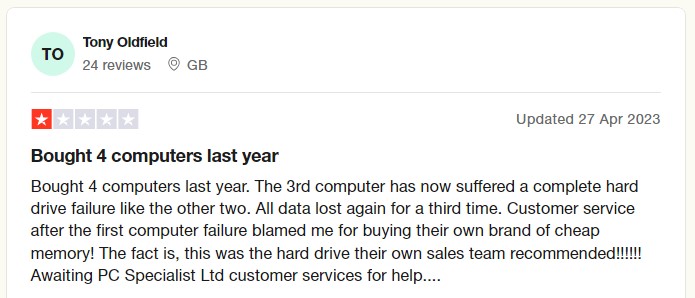
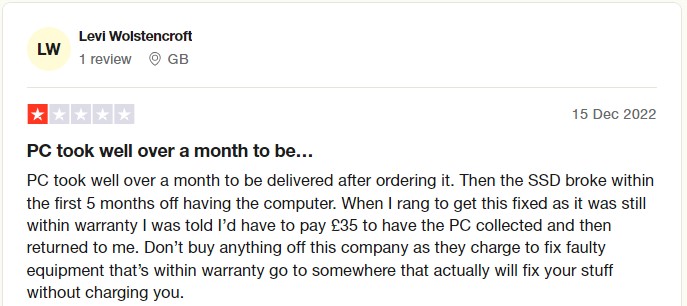
Using budget components directly results in more computer failures, trust me, I know firsthand.
That’s the first and probably the most direct way of saving on a computer build. Now on to the second.
2. Cheap & Quick Assembly
Whilst building a computer is not as complex as building a jet engine, there are still plenty of things that you only learn through experience.
There’s a quick way to put these things together and a right way, and quick does not usually equal right.
For example, some CPU cooling systems can be a pain to mount properly, you have to ensure they are sitting on the processor correctly, with the right amount of thermal paste applied, and then orientated the correct way to ensure good airflow.
Get any of these things wrong and the PC will quickly overheat and shut down, or the processor will throttle down performance levels to avoid overheating.
Even if you’re putting together a computer on the cheap with budget components, someone is still spending hundreds of pounds on the PC, so it needs to be built right, and that comes with experience.
This is why we only have people with years of experience building our systems, I’m talking 10+ years of first hand experience assembling and troubleshooting computers.
Other companies use far less experienced staff.
Look at the job listing for an online computer seller below:

That’s basically minimum wage.
I have nothing against people on the minimum wage at all but if I’m spending hundreds or thousands on new equipment I’d expect a certain level of skill and experience from the people assembling it.
I just don’t see how that level of skill or experience is possible on those wages.
What happens when you get inexperienced people assembling computers?
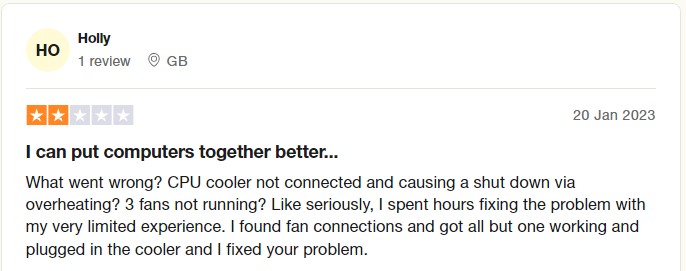
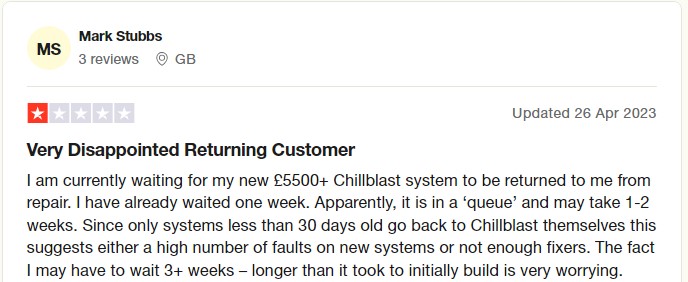
Those are just some of the reviews live right now for multiple companies speaking directly to what happens when corners are cut in the build process.
Would you be happy if your £5,500 new computer was assembled by someone with no real experience?
Next let’s move on to testing.
3. No Testing
Once a computer is assembled it needs to be tested to ensure everything is working properly.
I’d honestly say proper testing cuts our onsite failure rates (i.e. a computer going on to fail at a customers location) by over three quarters. Probably more.
Our testing takes 32 hours per machine and we constantly review temperatures, noise levels, and overall performance levels. If something is too loud, or too hot, or is not as fast as we would expect we fix it there and then, and then it gets re-tested, all before it reaches a customer.
Testing costs money. It takes time to complete and results need to be monitored and reviewed, all costing time and money.
How much testing do others do? I heard from a testing kit supplier once that Dell do 20 minutes of testing on their machines. With 20 minutes all you are going to see is the bare minimum of results.
Now I don’t 100% know for sure however I feel pretty confident in guessing that a lot of companies skip testing entirely.
Here’s why I feel confident in this guess:
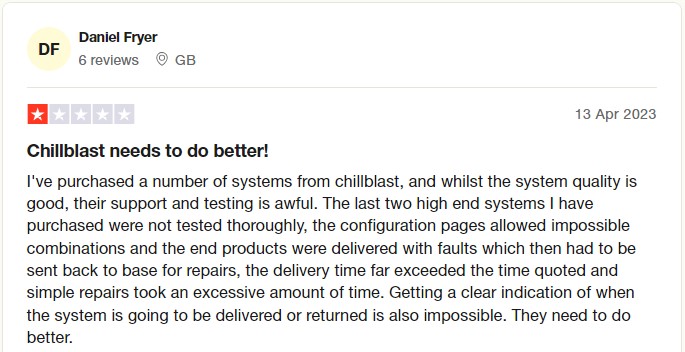
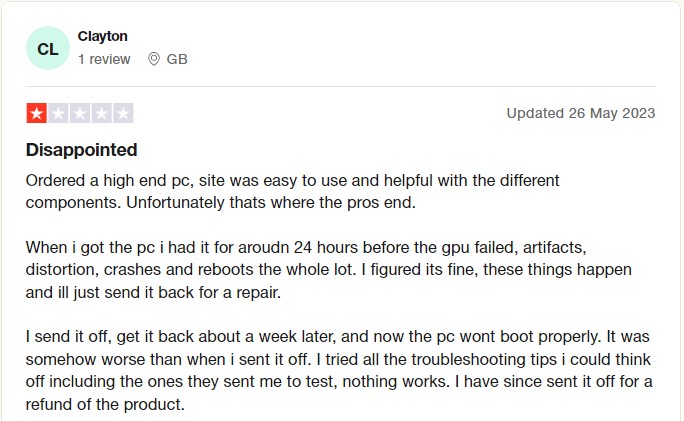
If a computer arrives with faults then barring a delivery disaster (which does happen occasionally) it means that it has not been tested.
4. Poor Ongoing Support
Answering the phone, replying to customer emails, arranging for computer repairs, it all takes up a lot of time and costs a significant amount of money.
It is the most difficult aspect of running a business in this industry, without any doubt.
If a customers calls or emails about a computer that’s having an issue then it needs to be dealt with quickly and efficiently, that means we have to be responsive. We have to quickly try to understand the problem, then work out the best and quickest way of getting them back up and running.
Again this is something that comes with experience.
It is not something that can be outsourced (we’ve tried and failed at that). it’s not something you can ignore, because that’s a surefire way of annoying a customer. It’s also not something you can expect a nonskilled worker to be able to deal with.
When someone calls us they generally get to speak to me directly. I’ve been running the business for over 15 years now and think I’m pretty good (hopefully!) at customer support by now.
If your new computer built with budget components, thrown together as quickly as possible by someone who’s got no real experience, is delivered to you with no testing, and then goes on to fail, then who exactly do you think is going to answer the phone when you ring?
Judging by the following reviews it sounds like you’d be lucky to get any kind of response:
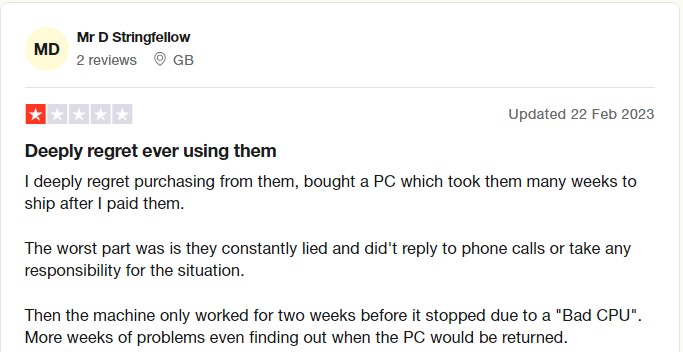

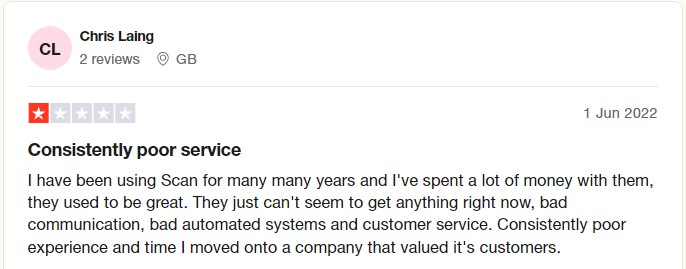
How are returns for repaired handled?

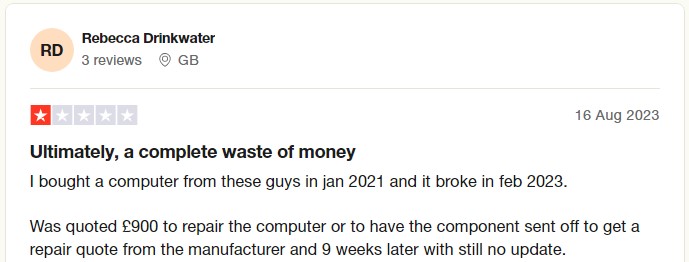
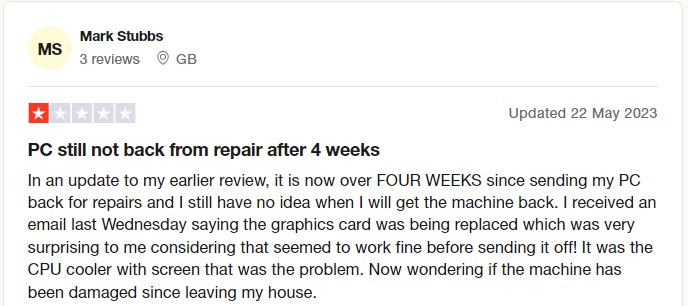
What about if you get so frustrated that you want a refund:
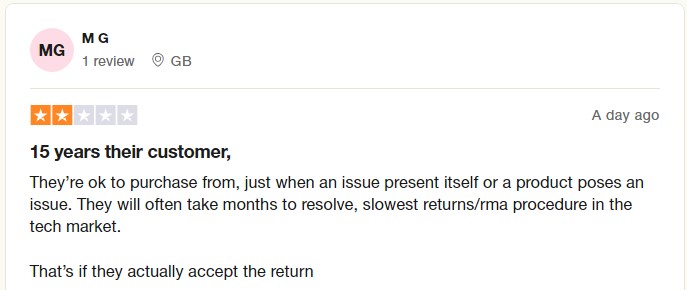
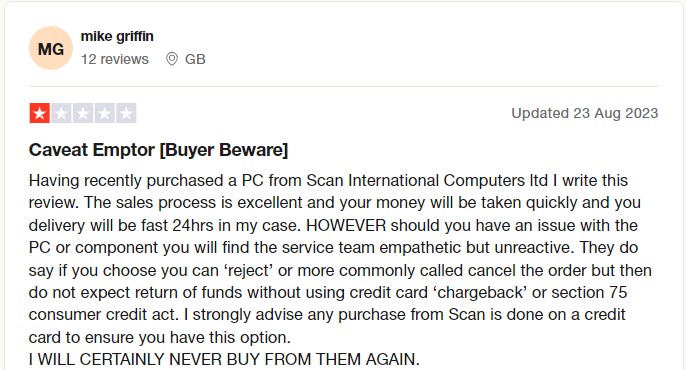
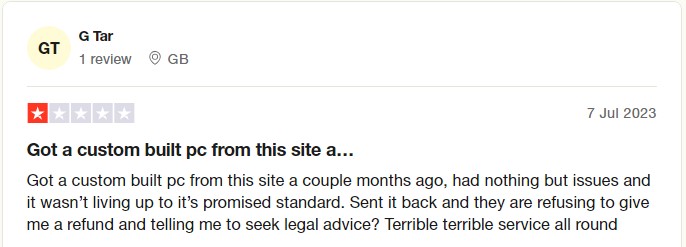
Is this all just sour grapes?
I know it’s easy for me to sit here and pick fault with some of these companies, and some may think it’s bad form, which I understand.
We should focus on our own strengths and not bad mouth competitors.
Talking down competitors is not what I’m trying to do here though. I’m simply trying to highlight the differences in how some companies operate and why that can sometimes make them look cheaper than they actually are.
I will also acknowledge that if you do look at reviews for the companies I’ve highlighted you will mainly find positive ones. All the companies I’ve researched have far more positive reviews than bad ones.
Why is that?
I think it’s because generally speaking computer components are pretty reliable now a days, and I think for the vast majority of builds that some of these companies do the resulting PC is probably fine.
Sure it might be noisier, or it might not have as long of a lifespan as some other computers, but the majority of systems will probably work.
The problems begin when a fault arises, whether that’s due to using cheaper parts, or an inexperienced worker not picking up on a problem during the build, or just because nothing has been tested to any great extent.
It’s kind of pot luck really, you might get lucky and be fine, or you might get unlucky and get caught up in a bit of a nightmare dealing with some of them.
We try and remove as much of the luck factor as possible by using good quality components, experienced technicians, and proper testing, and when something does go wrong we actually care about fixing it.
Our own reviews speak to this, you can read them all here: https://uk.trustpilot.com/review/multiplemonitors.co.uk
Hopefully I’ve given you some insight into how sometimes things at other online sellers may look cheap and why we can’t and won’t always price match.
Using cheaper budget parts can reduce build costs. Employing inexperienced staff on minimum wages saves money. Doing little or no real testing reduces costs. Providing a minimal support service and charging customers for warranty repairs saves them money.
Add all these factors together and it becomes a bit clearer why some of their kit can sometimes look lower cost.
Is this entire article an effort to justify high pricing?
No, to be honest we are not overpriced. On a like for like basis we stack up competitively against virtually anyone else, and if you compare us to ‘specialists’ in our field (like Falcon in the US) we are way lower priced.
We are not the bottom end of the market though and don’t want to be, we couldn’t offer our service levels or stand by the quality of our computers if we aimed to be the cheapest out there.
I think we have a good balance of price, performance and service, and 15+ years in this market seems to back us up on this.
As ever, any questions, comments, or feedback on this or anything else just get in touch!
Written by Darren @ Multiple Monitors
Last Updated: August, 2023